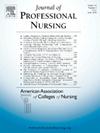Conceptual model and design of an initiative to build nurses' resilience and ethical practice
IF 2.9
3区 医学
Q1 NURSING
引用次数: 0
Abstract
Background
Healthcare faces a nursing crisis with high turnover, burnout, and faculty shortages, which requires innovative educational approaches that bridge the gap between education and practice.
Purpose
To present the conceptual model and design of a statewide, trans-institutional academic-practice collaboration that holistically builds nurses' resilience and ethical practice across the education-to-practice continuum.
Method
Development of the Renewal, Resilience, and Retention (R3) Initiative based on adaptation of the Mindful Ethical Practice and Resilience Academy (MEPRA), social ecological framework, and stakeholder input across eight schools of nursing and five hospitals in Maryland.
Results
The R3 Initiative created a scalable conceptual model with four foundational constructs supported by 42 evidence-informed educational resources, faculty development workshops, and multi-tiered learning communities that enable integration of resilience content into existing curricula without major redesign.
Conclusions
The R3 Initiative provides a replicable framework for building nursing workforce resilience through coordinated education-practice partnerships and evidence-informed interventions that address individual and systemic factors contributing to burnout and disengagement.
概念模型和设计的倡议,以建立护士的弹性和道德实践
医疗保健面临着高流动率、职业倦怠和师资短缺的护理危机,这需要创新的教育方法来弥合教育和实践之间的差距。目的提出一个全州范围内,跨机构的学术实践合作的概念模型和设计,在教育到实践的连续体中全面建立护士的弹性和道德实践。方法根据马里兰州八所护理学院和五所医院的正念伦理实践和恢复力学院(MEPRA)、社会生态框架和利益相关者的意见,制定更新、恢复力和保留(R3)倡议。R3计划创建了一个可扩展的概念模型,其中包含四个基本结构,由42个循证教育资源、教师发展研讨会和多层学习社区支持,可以将弹性内容整合到现有课程中,而无需进行重大重新设计。R3倡议提供了一个可复制的框架,通过协调的教育-实践伙伴关系和循证干预措施,解决导致倦怠和脱离工作的个人和系统因素,建立护理人员的复原力。
本文章由计算机程序翻译,如有差异,请以英文原文为准。
求助全文
约1分钟内获得全文
求助全文
来源期刊
CiteScore
4.80
自引率
8.00%
发文量
153
审稿时长
52 days
期刊介绍:
The Journal will accept articles that focus on baccalaureate and higher degree nursing education, educational research, policy related to education, and education and practice partnerships. Reports of original work, research, reviews, insightful descriptions, and policy papers focusing on baccalaureate and graduate nursing education will be published.

 求助内容:
求助内容: 应助结果提醒方式:
应助结果提醒方式:


